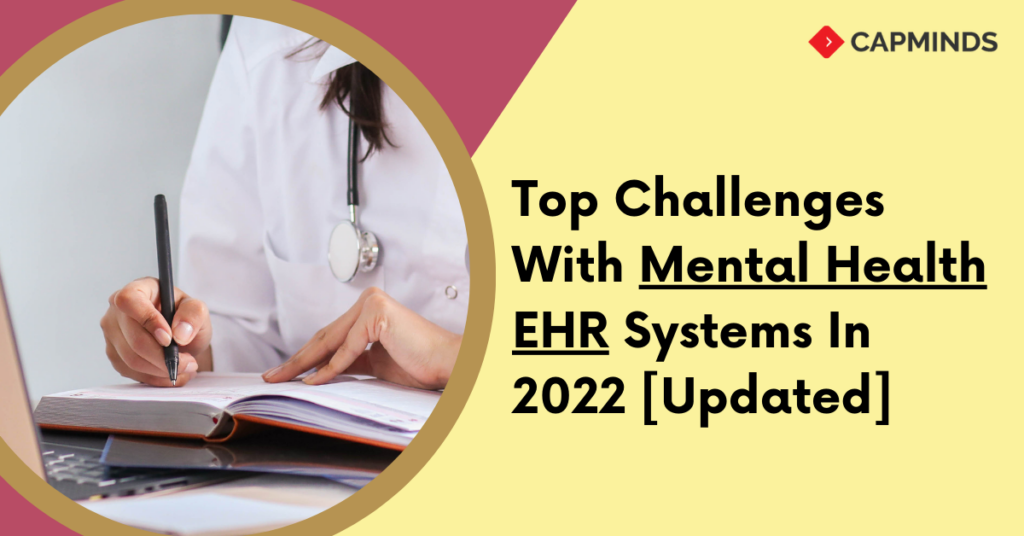Top Challenges With Mental Health EHR Systems In 2025 [Updated]
As a result of COVID-19, mental health practice software is gaining increasing attention. Mental health app developments come in many forms, and one such is mental health EHR software. These solutions are loaded with advantages for healthcare providers and patients alike.
Within this domain, mental health EHR software solutions continue to be the preferred choice of development with mental health practices. Considering the unique requirements and challenges of the mental health sector, EHR mental health records solutions are specifically geared to address specific needs.
Mental Health Market Overview
It is no surprise that with the increased adoption of technological and IT solutions in the healthcare sector, mental health practice software is witnessing rapid growth. Electronic health records solutions are being increasingly sought out to manage the administrative, clinical, and financial functions of mental health professionals and patients. With the adoption of EHR in mental health, the potential of technological advancements has risen significantly.
The pandemic has brought mHealth solutions to life, and mental health is no exception to its benefits. Mental health services, such as telephonic counselling, talk therapy, video conferencing with professionals, etc., is now achievable through integrated healthcare systems.
With an increased focus on value-based care and a rise in patient engagement systems, mental health app development can over remote care facilities like never before. Finally, a considerable decline in the stigma associated with mental health services has caused a rise in the demand for mental health services.
RELATED: MENTAL HEALTH EHR: 5 MAJOR FEATURES TO CONSIDER
Challenges in Mental Health Care:
1. Data Privacy Concern:
Due to the nature of mental health services, patient data is of a highly sensitive nature. This data sensitivity level causes concern with patients and mental health professionals towards maintaining privacy and security. Therefore, EHR for mental health providers must be developed with careful attention to EMR and EHR security protocols. Healthcare EMR systems should be deployed with advanced security features for complete patient health data security.
Electronic health records software can include multiple access layers, depending on the specific organization. This controls data breaches and authorized control within behavioural health EHR/ EMR software. Finally, adopting HIPAA compliance is a mandatory requirement for EHR software for behavioural health.
2. Financial Constraints:
Mental health practices have suffered financial challenges for as long as one can remember. EHR systems for mental health providers must be developed from the clinical practice’s perspective. The financial requirements of EHR for small mental health practices must not be overlooked.
Mental and behavioral health EHR should be designed to make the medical billing process easier and prompt by mapping ICD-10 codes to complaints via healthcare interoperability. Automating the mapping of behavioral health CPT codes is imperative for EMR software in decreasing repetitive administrative, financial tasks. It will further support time management and patient health through healthcare automation of EHR medical records.
RELATED: THE COMPLETE GUIDE TO TELEHEALTH FOR MENTAL HEALTH
3. Usability Hurdles:
It was assumed that the usability of mental health software was loaded with hurdles and challenges for a long time. This assumption was based on the fact that mental health professionals have particular requirements for the functioning of behavioral health EHR.
Among the many healthcare provider solutions available, behavioral health systems require advanced patient data sharing, electronic data exchange, and integrated care management features. To address these challenges towards usability, the ideal option would be a custom healthcare solution that is tailor-made to the specific requirements of the mental health practice.
Choosing Your Mental Health Solution:
Speaking of customized behavioral health systems, the first order of business is for the mental health practice to have a clear idea of their specific needs. A definitive understanding of the development needs will ensure that the EMR software can fill the gap, clinically and financially. This understanding should be based on several factors:
- Clinicians needs
- Current challenges
- System preferences
- Patient goals
- Management requirement
Conclusion
With mental health practices taking notice of the advantages of mental health software, the choice of the right EHR system can be confusing. It would be prudent to analyze the specific demands relevant to the practice and choose a system that comes closest to fulfilling those needs.
While the features mentioned above are highly beneficial, they may or may not be required by every mental health organization. The guide above can serve as a broad outline from which customized needs can be developed. Once the requirement is clearly outlined, you can begin your developmental journey with considerable awareness and ease.
CapMinds offers the best EHR implementation services and allows mental health clinics to:
- Integrated billing support and more
- Set up a secure online patient portal to schedule and manage appointments
- Conduct online telehealth visits with your patients
- Provide clinical and financial reports




